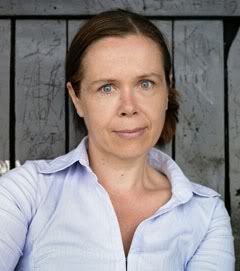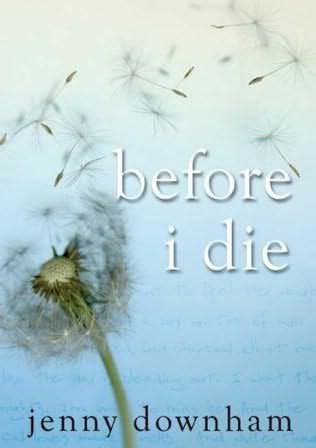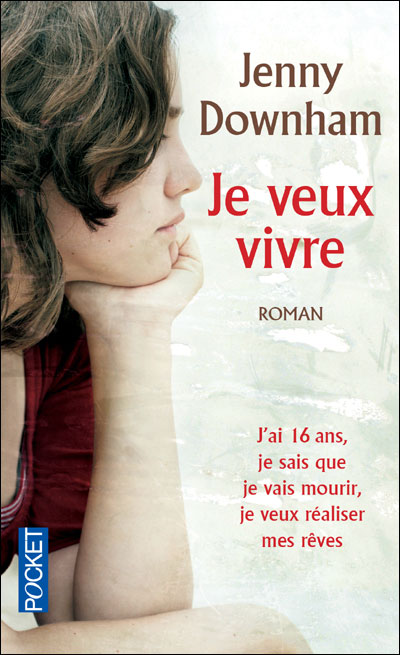Je veux vivre, Jenny Downham
(8h10)
On pourrait croire que tout est dit dans le quatrième
de couverture : Tessa a seize ans, elle va mourir et dresse une liste de différentes choses à faire avant que cela ne se produise.
Mais Je veux Vivre ne peut se résumer ainsi. Certes, nous ne sommes pas dupes, nous sommes ancrés dans la réalité, elle va mourir. Toutefois, ce roman ne berce jamais dans le pathos. " Quel est l'angle de Richard? Le total mélo pauvre petite fille mourante, ou bien a-t-il prévu quelque chose d'original?"
Nous évoluons, nous gagnons en maturité, tel Tess, au fil des pages "Je m'assieds près de lui et pose ma main sur son genou. << Je ne retournerai pas à l'hôpital, Papa>>. Il s'essuie le nez avec sa manche et me regarde. On croirait voir Cal". Un moment très drôle mais touchant est celui où elle prend des champignons hallucinogènes, son insouciance et son innocence se révèlent ici. Elle est persuadée que rien ne se passera si elle reste accrochée à l'arbre... ("Il faut que je reste ici, dans ce bois. Il faut que je vive à l'écart du monde moderne, de tous ses gadgets, et je guérirai"). Celle-ci, devient peu à peu consciente aussi, au fur et à mesure des pages ou des jours (qu'elle compte inlassablement), que la vie n'est pas ce que nous avons décidé et change alors quelques objectifs comprenant la jeunesse de ses désirs.
L'histoire tourne principalement autour d'un cercle très fermé : l'entourage de Tess. Il y a très peu de personnages. L'auteur voulait montrer ainsi la solitude, l'isolement des vrais malades. Notre inaptitude à les aider ou notre indifférence générale sûrement. "Je les regarde comprendre. Cela démarre dans leurs yeux, puis gagne leurs joues et leur bouche. Tellement prévisible. Et comme il n'y a plus de question polie possible, elles n'en posent plus. J'aimerais les sortir de cette situation embarrassante mais je ne sais trop comment les libérer ". Bien-sûr, nous souhaiterions tous qu'elle vive, qu'elle exauce chacun de ses voeux ("Je passerai mon bac, à la place. Et puis j'irai à l'université. (...) Je trouverai du travail et peut-être qu'un jour j'aurai des enfants: Chester, Merlin et Daisy".), mais nous n'en avons pas la possibilité et restons coi devant le destin, la fatalité.
Ce qui est touchant dans l'histoire de Tess, c'est que nous sommes TESSA tout au long du roman (comme chacun des néons de la ville allumés par Adam). Nous ressentons sa frustration, son dégoût ou son désir de vivre (" Je me presse contre lui, plus près, mais ce n'est pas assez près. Je voudrais grimper à l'intérieur de lui. Vivre en lui. Nous ne sommes plus que désir. " ), sa surprise face à certains caprices du destin.
Jenny Downham a su jouer avec un style d'écriture différent à chaque étape. Au tout début, les phrases courtes et successives montrent la véhémence des adolescents ("C'est passionnant tout ça, mais faut qu'on y aille, nous. Je dois dresser la liste des invités à mon enterrement. (...) Dommage que je ne puisse pas y être moi-même, j'adore les fêtes. Envoyez-moi un message s'il y a des bons cantiques auxquels vous pensez."), puis celles-ci se font plus longues, poétiques. Tessa prend à cet instant conscience du cadre, de la nature dans lesquels elle évolue et se préoccupe même du "froissement d'ailes d'un oiseau qui traverse le jardin. Il est très beau, cet oiseau, quand la brise ébouriffe ses plumes noires avec un reflet bleu, comme du pétrole sur la mer". Elle se montre d'ailleurs moins impétueuse. Fini les inepties, les moments de folie, elle est sereine. Elle sait, elle va mourir "Je veux juste rentrer à la maison". Puis (ce qui m'a d'ailleurs troublé et pensant qu'il y avait eu un problème au cours de l'impression), les derniers instants où seules quelques bribes nous parviennent. Anna, son infirmière, nous avait pourtant prévenue "Tu vas probablement dormir très souvent. Ne pas souhaiter parler (...). Dans quelques jours, tu traverseras des périodes alternées de conscience et d'ineconscience. A ce stade-là, tu ne pourras plus répondre aux gens, pourtant tu sentiras leur présence autour de toi et tu entendras ce qu'ils te disent. Et finalement, tu t'endormiras pour toujours, Tess". Mais la rapidité est brute, saisissante.
Nous ne pouvons sortir indemnes de cette lecture. Nous sommes obligatoirement interpelés. Que ferions-nous à la place de Tess? Resterions-nous recroquevillés sous les couvertures comme elle au début? Serions-nous prêts à braver l'impossible, l'interdit comme elle a l'intention de faire? Après tout...
Ce livre montre aussi comment tout un chacun évolue par rapport aux expériences multiples de la vie. Ainsi, Zoey qui, je pense, est détestée par tout un chacun à la lecture du roman, par la violence de ses propos, se montre plus douce et agréable lorsqu'elle se retrouve enceinte. Il y a aussi Cal, le petit-frère qui n'a jamais auparavant fait face à la mort et qui prend le sort de sa soeur comme un jeu. Enterrant, par exemple, tout en s'amusant le cadavre d'un oiseau. Il ne sait pas ce qu'est la mort. Il ne sait pas le manque, il ne sait pas l'absence. Il se pose de nombreuses questions et fait des recherches sur internet. " <<Qu'est-ce qu'il va m'arriver à moi, Cal? >>. <<Je vais me renseigner, je te dirai.>> Et il part chercher une bêche dans la remise". Puis, peu à peu il réalise, que sa soeur s'éteint et celui-ci termine avec " Au revoir,Tess. Viens me hanter si tu as envie. Ca ne fait rien "
A travers l'histoire de Tessa, Jenny Downham a voulu faire un hommage à la vie, souhaiter pour Son lecteur non pas une longue et heureuse vie, mais la vie qu'Il désire. Toutes les pages nous interpellent comme des signes, et font écho avec les souhaits de l'héroïne : Ne Regrette Rien. Agis. Finissons avec ce qui pourrait bien être la phrase-clé du roman, "même si c'est le hasard qui régit l'univers, je me sens le pouvoir de provoquer un changement".
__________________________________________________________________________________________
Voici quelques liens vers différentes interviews de l'auteur :
- New-York Times ici
- Once upon a bookcase
Interview with Jenny Downham
 The plot for Before I Die is such an incredible idea. How did you come up with the idea for it?
The plot for Before I Die is such an incredible idea. How did you come up with the idea for it?I didn’t know Tessa was dying when I began writing. I just had this idea about two friends who were very different from each other and I started with their voices. Tessa was angry and sad and Zoey didn’t seem able to comfort her. It became apparent after only a few weeks writing that Tessa was ill. I knew if she was terminally ill that it would increase the narrative drive.
As a story-teller, your characters need boundaries to push against, and there’s no bigger boundary than death. Putting this kind of ticking clock into the story increased the narrative drive, but also risked losing tension because the end of the story was determined. The challenge became how to make a journey towards the inevitable interesting. That’s where the ‘before I die’ list came in.
What research did you have to do for this book?
I read a lot of books about terminal illness as well as fiction and poetry about dying. Susan Sontag’s ‘Illness as a Metaphor,’ was very inspirational, as was Anatole Broyard’s ‘Intoxicated by my Illness’ and Gillian Rose’s ‘Love’s Work.’ I read a lot of poetry about bereavement and loss, finding particular inspiration in Raymond Carver’s collected poems, ‘All of Us.’
Two nurses helped me with medical detail over many months. One of them was a palliative care nurse who worked with terminally ill teens. It felt really important not to get too embroiled in the medical stuff though. I wanted it to be accurate, but it was never supposed to be a medical or hospital-based story.
Why did you decide to write a story about death for your debut?
I never plan structures for novels, instead I do thousands of words of ‘freewriting’ and eventually I find a story in the pages I turn out. I revise as I go along, working on several chapters at once.
I started Before I Die with two characters (Tess and Zoey) and the idea of a friendship. I had their voices but not much else. I didn’t know what it was about, but I couldn’t let go of them.
Sometimes the way forward was obvious – if it were film-making, it would be like a take in ‘one.’ But there were also points where the way ahead was murky and unknown, and then I found myself thinking consciously about structure and pace.
Funnily enough, I don’t actually think of the book as being ‘about death.’ Tessa attempts to live as if there was only ‘this’ moment, right now. I think this is something people relate to, but find extremely hard to do. Most of us save up for the future, looking forward to tomorrow when things might be better or different somehow. But Tessa is forced to value things in a different way, to seek out the things that truly matter.
Life becomes concentrated when it’s boundaried. Death is the biggest boundary of all. When you can’t look deeply into the future, then all you have is the present, and in the present, small ordinary things become rich. By looking so closely at death I was actually hoping to write about life.
 Before I Die is such a terribly moving and heart wrenching novel. Why did you choose to write the novel from Tessa’s point of view, that of the dying?
Before I Die is such a terribly moving and heart wrenching novel. Why did you choose to write the novel from Tessa’s point of view, that of the dying?I wanted the reader to inhabit Tessa’s body in the hope that they would have both a visceral and an emotional response. If Tessa’s body does the talking - if the reader experiences a lumbar puncture or a haemorrhage with her - then it inevitably pushes the reader closer to the physical self. I wanted to achieve an immediacy between the body’s decline and the words Tess uses to describe what’s happening to her. Using first person, present tense meant that she had to narrate her own death, and that was a great challenge.
Your novel is very life affirming. Did you write Before I Die with the intention of making people think about the longevity of their lives and to get out there and do things?
I was attempting to write a good story, one that moved readers emotionally, but also made them think. So, something as random as illness happens and Tess has to make sense of it. Why me? Did I do something wrong? What choices do I have left? What actually am I in charge of in my life? There are no ‘lessons’ though. I think storytellers should give other world’s, other lives, so that reader’s can empathise, can think ‘what would I do if that were me?’
What is your opinion on how YA novels deal with death and bereavement?
Books can address difficult situations and confront social issues and help readers deal with real-life challenges. They can transport you, make you think, move you…. the list is endless. I think good YA novels should be beautifully written, shouldn’t patronise and shouldn’t make assumptions that teens are not interested in difficult or complex issues.
Young adults are experiencing so much for the first time and are drawn, I think, to stories that reflect that intensity, or which evoke feelings that match the emotional rollercoasters they're riding in their own lives.
There are some wonderful books out there that deal with very difficult subjects extremely sensitively.
Were there any books you found dealt well with this topic when you were a teen?
I was always attracted to books that could transport me from the rather boring town I grew up in to somewhere ‘other.’ For me, it was the story - with all its complexities, with the emotional truths it uncovered, the experiences beyond the everyday that it gave – that was the reason I read.
I didn’t experience the death of a loved one until my late teens, but I did know the more general feelings of pain and isolation that came with teen territory and I found it so cathartic reading about someone else’s troubles!
I had a fantastic teacher who used to hand me books in the corridor – D.H.Lawrence, Gunter Grass, Jane Austen. He introduced me to poets – Dylan Thomas, John Donne, Keats, R.S.Thomas, Auden. He also spoke to the librarian and I was allowed to take out books that were clearly marked as being for older children. On my first visit, I chose Harper Lee’s ‘To Kill a Mockingbird’ and D.H.Lawrence’s ‘The Rainbow,’ both of which have a very special place in my heart. I also loved Ann Holm (I Am David) and Robert C.O’Brien (Z for Zachariah).

La Liseuse, Jean-Honoré Fragonard

